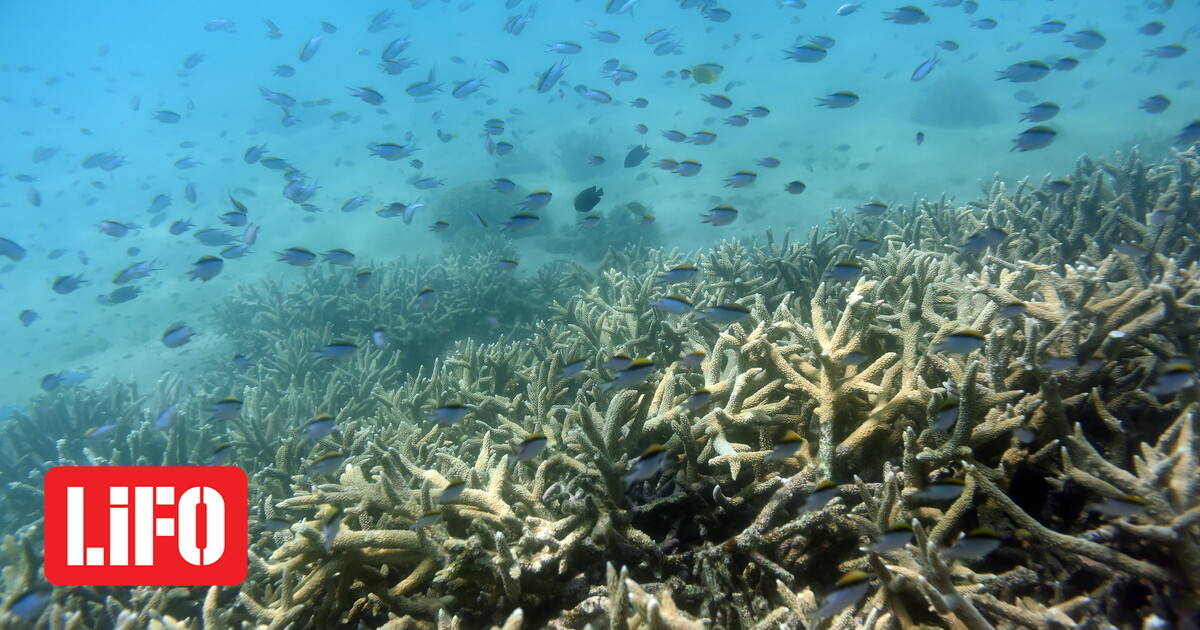
A similar situation to the environmental disaster caused by uncontrolled forest fires on the surface of the earth is being experienced by the underwater Great Barrier Reef.
the the great Barrier Reef It has just experienced its worst summer on record, and the US-based National Oceanic and Atmospheric Administration (NOAA) announced last month that… The world is witnessing a rare global mass coral bleaching event – the fourth since the late 1990s – affecting at least 53 countries. Coral reefs are a victim of rising global temperatures that have broken historic records over the past year. Both fossil fuels, which increase carbon emissions, and the impact of El Niño, which causes ocean temperatures in this part of the world, have greatly affected the situation on the Great Barrier Reef, off the east coast of Australia.
Coral reefs around the world are being bleached by rising sea temperatures / Image: EPA
CNN is hosting a major program on the Great Barrier Reef, which is particularly affected by the climate crisis. “What is happening now in our oceans They are like fires under water“We will have so much warming that we will reach a tipping point and we won’t be able to come back from it,” Kate Quigley, a lead researcher at Australia’s Mindero Foundation, told CNN. pridect.
the Coral bleaching This occurs when sea heat puts corals under stress, forcing them to expel algae from their tissues, draining their color. Corals can recover from bleaching if temperatures return to normal, but they will die if the water remains warmer than normal. “It’s a disaster,” said Professor Uwe Høgh-Guldberg, a climate scientist at the University of Queensland in Australia and chief scientist at the Great Barrier Reef Foundation. “Temperatures have become so hot, they are off the charts… they have never been recorded at this level before.”
A quarter of the species that depend on coral reefs would disappear if coral reefs disappeared / Image: EPA
What the destruction of marine ecosystems means for biodiversity
This will destroy marine ecosystems About a quarter of all species that depend on coral reefs eventually end for their survival – and will threaten an estimated 1 billion people who depend on coral reef fish for their food and livelihoods. Coral reefs also provide vital protection for coastlines, reducing the effects of floods, hurricanes and sea level rise. “Humanity is being threatened at a rate that I’m not sure we really understand,” Hoegh-Guldberg told CNN.
Great Barrier Reef/Photo: EPA
beyond the Great Barrier Reef, The massive heat wave sweeping the globe has already affected some of the world’s most famous coral reefs – Including those in the Red Sea, Indonesia and Seychelles. Last year, rising ocean temperatures also caused a spike, and US experts predict more damage next summer. “I’m increasingly concerned about the summer of 2024 for the greater Caribbean and Florida,” said Derek Manzello, coordinator of NOAA’s Coral Reef Monitoring Program. In February, the National Oceanic and Atmospheric Administration (NOAA) added three new levels to its coral bleaching warning maps to allow scientists to assess the new extent of underwater temperature rise.
Australia, fossil fuels and efforts to save the Great Barrier Reef
Over the past six years, Peter Harrison and his team at Southern Cross University in New South Wales have been developing the In Vitro Coral Fertilization programme. To increase coral reproduction On every coral reef. Researchers use fishing nets to capture healthy coral brood and then develop the larvae in floating tanks before releasing them into damaged areas of the reef to help the reefs recover. “We need to act now to preserve coral life on as many reefs around the planet as possible,” Harrison said.
There are also research projects at the Australian Institute of Marine Science (AIMS) looking at breeding heat-tolerant corals that can survive high temperatures and developing artificial intelligence tools to try to make some processes scalable to suit the sheer size of coral reefs.
The Australian government has faced criticism for pumping hundreds of millions of dollars into countless coral reef research projects while doubling the use and production of climate-changing fossil fuels – as well as agreeing to open four new coal mines by 2023.
Australia has committed to obtaining 82% of its electricity needs from renewable sources by 2030, and embarking on a path to net-zero emissions by 2050. But this pace of transition is too slow for many activists, who suggest we are at a tipping point.
Coral reefs on Earth are dying
Scientists predict that at the current rate of warming, the average global temperature could be 2 degrees Celsius above pre-industrial levels by 2050. At this level of heat, 99% of coral reefs will simply die. For marine biologists watching this death, there is a real sense of sadness. David Washenfeld, research program director at AIMS, said everyone associated with coral reefs “experiences” feelings of sadness and helplessness. “The path we’re on now is really scary,” he says.
Average ocean temperature from 1979 to present / Source: Copernicus Climate Change Service / ECMWF / CNN
Harrison, the researcher at Southern Cross University, described it as “ecological grief”: “If you swam over a reef system that just a few months ago was so vibrant and colourful, the sounds of the reef are amazing.” “And you swim over it again, and the whole thing looks like a graveyard. It is as silent as a cemetery».
With information from CNN

“Avid problem solver. Extreme social media junkie. Beer buff. Coffee guru. Internet geek. Travel ninja.”





More Stories
In Greece Porsche 911 50th Anniversary – How much does it cost?
PS Plus: With a free Harry Potter game, the new season begins on the service
Sony set to unveil PS5 Pro before holiday season – Playstation